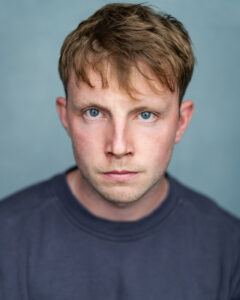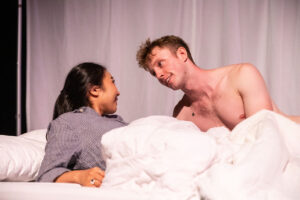Chester actor Harrison Tipping – an actor worth watching.
(Published: 2023/12/06 at 11:07 pm)
Edition Fifty-Seven- Week Fifty-Seven:
Written by: Mercedes Barreto

Over several years, I’ve had the increasing pleasure of witnessing Harrison Tipping’s extraordinary talent on both stage and screen, and I must say, his career is undoubtedly one that demands attention. Originally hailing from Chester, England, Harrison has seamlessly transcended boundaries with his remarkable performances, showcasing an impressive range and versatility that sets him apart in the world of acting.
One of Harrison’s standout achievements is his leading role in an undisclosed full-length feature filmed in Austin, Texas. Starring alongside industry heavyweights such as Eric Roberts and Matthew Marsden, Harrison’s contribution to the film, despite its legal confidentiality, speaks volumes about his rising status in the film industry.
His portrayal of Romeo in Romeo and Juliet with the Blind Cupid Shakespeare Company further solidified Harrison’s reputation as a Shakespearean virtuoso. The fact that every single performance sold out attests to his ability to captivate audiences with his compelling and authentic performances.
Not only does Harrison shine on the silver screen, but his stage presence is equally enthralling. His performance in Michael Hollinger’s “The Virgin Queen Entertains Her Fool” in Florida was a massive success, underscoring his ability to seamlessly transition between mediums.
One cannot ignore the accolades Harrison has amassed in his incredibly impressive career. “Stand To,” a film exploring the lives of military personnel post-conflict and the harrowing effects of PTSD, earned him the Best Duo award at the New York International Film Awards in April 2021. His collaboration with co-star Megan Haly showcased not only his acting prowess but also his ability to forge strong on-screen chemistry.
In my observation, what sets Harrison apart is not just his skillful performances, but his dedication to diverse roles that challenge and showcase his versatility. Whether tackling the complexities of Shakespearean drama or delving into the raw realities of post-conflict trauma, Harrison approaches each role with a commitment that is truly commendable.
As a burgeoning force in the entertainment industry, Harrison Tipping’s career is one that demands close scrutiny. His ability to seamlessly navigate between film and stage, coupled with his remarkable performances alongside established actors, positions him as a talent to watch. In conclusion, Harrison Tipping’s career is on an upward trajectory, and I am eagerly anticipating future projects that will undoubtedly solidify his status as a prominent and influential figure in the world of acting.
As a bonus, I’ve had the pleasure of sitting down alongside Harrison for a chat about his career.
You’ve portrayed Romeo with the Blind Cupid Shakespeare Company in New York. How has your background in classical theater, particularly with Shakespearean plays, influenced your approach to acting in more contemporary works?
A: I think if you can act Shakespeare, you can act in anything. His writing forces you to truly understand the human condition, interpret text with a deep and rich understanding, and then make interesting and truthful choices about the character. Shakespeare has allowed me to take all those skills and apply them to contemporary work on both the stage and the screen. I really feel at home in all of these types of performances due to my experience with classical text.

Playing Romeo is a demanding role, full of passion and complexity. Can you share a specific moment or scene from your portrayal that challenged you as an actor, and how did you approach overcoming that challenge?
There’s a scene where Romeo finds out he has been ‘banished’ from Verona and will never be allowed to return. I found this scene particularly difficult, given the high stakes of the situation, while trying to find what it is Romeo is fighting for. Now, it might seem obvious, but believe me it’s not easy to believe you’ve been banished from the place and people you love and to not just fall on the ground and cry. I had to discover the balance of fighting to stay while dealing with the devastating reality of having to leave. Avery Banks really helped me to overcome this challenge.
Transitioning between stage and screen can be intricate. How does your experience in live theater, especially in a role like Romeo, inform or differ from your approach to acting in films?
I truly believe that acting is acting. No matter whether you are in a thousand-seat theatre or be it a camera right in your face; the main goal is to be truthful. Whether size brings truth or nuance, all I’m striving for is to find the truth of the moment. Of course, we have to be aware of not showing too much when a camera is there, however, I’m always doing my best to focus on the situation that the character is in and not the result intended for the camera/ audience.
“The Virgin Queen Entertains Her Fool” by Michael Hollinger at Palm Beach Drama Works must have been a unique experience. Can you share a particularly memorable moment from that production that stands out in your mind?
I was really nervous about the performance of ‘Virgin Queen’ due to the fact I was the comedic relief and I was acting opposite Kimberly S. Fairbanks, who has worked with the likes of Bryan Cranston and Colin Farrell. The reason this moment stands out is because I remember walking onto the stage and sitting down that feeling where time felt so slow, and then it was my first line, and all of a sudden it was the end of the show. I felt I was in what people call “the zone” and it felt like such an achievement to have not crumbled under pressure and to have risen to the occasion.
Tell us about your character in “The Virgin Queen Entertains Her Fool”. What did you enjoy about him? What was the challenge?
Playing the Fool in ‘Virgin Queen’ was an absolute joy! The freedom I had as the character was endless, my choices could change and I felt I could always play and find new things. I’ve often thought comedy wasn’t really my strong point, but after playing the fool in this I can’t wait to do some more comedic plays. It’s truly a blessing to play such a fun and dynamic character.
Michael Hollinger is known for his distinctive storytelling. What aspects of Hollinger’s writing in “The Virgin Queen Entertains Her Fool” resonated with you as an actor, and how did you bring those elements to life on stage?
Michael Hollinger is just great! He has a fantastic balance of comedy and drama in his plays. I particularly enjoyed playing around as the character to bring comedic relief to the often dark and sad moments. I loved even more then, discovering harsh truths, as the fool which pulled out my own vulnerability as an actor, which really showed the depth of the character and the story. This is a testament to Michael’s writing. I feel I resonate with this a lot as a person as I often find myself having fun and bringing charm to life and then facing something really difficult, which often makes me much more introverted and quieter. Michael’s writing does that to you.
From the passionate Romeo to the historical character in “The Virgin Queen Entertains Her Fool,” your range as an actor is impressive. How do you ensure versatility in your roles while maintaining authenticity in each character you portray?
I think an actor’s job is to be the full embodiment and to become each character they play. Now, some characters are close in nature to the people we are and some require much more time and thinking to really understand the difference between us and them. One of the funniest and most challenging things as an actor is to find the nuances and differences between yourself and the character and then to truthfully embody them with heart and soul. I like being versatile and always strive to do so with every character I play.
 Acting often involves a collaborative process with directors, fellow actors, and crew. Can you share an instance where collaboration significantly enriched your performance, either in a play or a film?
Acting often involves a collaborative process with directors, fellow actors, and crew. Can you share an instance where collaboration significantly enriched your performance, either in a play or a film?
Working with Shannon Haly is always a privilege for me. She’s a great friend and such a good person to collaborate with. Earlier this year we did a play called ‘Changing the Sheets’ and the teamwork on that project was so much fun and I really learned a lot from it. The more collaborative a project is I feel only enriches the end product we are all striving for.
Every actor has their unique way of preparing for a role. What are some rituals or practices you follow to immerse yourself in a character, especially when taking on roles with historical or cultural significance?
My preparation changes every single time! I really wished I had a set way of doing things but I don’t. That can bring a lot of uncertainty, with it as an actor but I feel that’s a good thing. We should always be wanting to enter the darkness with an open heart and mind to see what we discover each time we perform.
If you could choose any role, whether from Shakespearean classics, contemporary plays, or iconic films, as your dream role, what would it be, and why?
I want to play Richard III. He is Shakespeare’s best character, in my opinion. I love how specific he is, the depth and vulnerability of him alongside his revengeful rage, which he shows the audience. He’s also really funny, which again shows the range of his personality.
Juggling between theater and film requires a delicate balance. How do you navigate between the demands of live performances and the more controlled environment of film sets, and do you have a preference for one over the other?
I love both theatre and film. I definitely think they require different amounts of energy output. On stage, you are locked in for the ride as soon as you start, whereas on film there’s a lot of downtime, which you have to be careful to not waste too much energy on. I’m a big believer in not worrying about what you can’t control, so when it comes to film I’m always focusing on what I’m doing and when to ‘turn myself on’.
Actors often talk about the transformative power of getting into character. How do you approach the process of transforming yourself into a character, and what role challenged you the most in terms of personal transformation?
I think the body tells us so much about a person. One of the biggest focuses for me, as an actor, is how the characters walk, move, and hold themselves depending on who they are around or where in the story they are. I played King Lear, which felt like a huge transformation for me given the size of him and who he is. I discovered a lot about him through a physical understanding of who he was. I think transformation as an actor is one of the best tools we have.
Live performances allow for a direct connection with the audience. Can you share an instance where the audience’s reaction had a profound impact on your performance or the way you approached a particular scene?
There’s a scene in Romeo and Juliet where Romeo talks about killing himself. I remember one night delivering that line to an audience member and the look in their eye was devastating. It felt as if they wanted to say something or get on stage and stop me. On a more lighthearted note, an audience member once told me to “go get her” when I was debating if I should go to Juliet’s balcony- that was awesome!
Given your diverse experiences in theater and film, what advice would you give to aspiring actors who are looking to build a versatile and impactful career in the entertainment industry?
Take every opportunity that comes your way. Don’t be arrogant- it’s a team sport. Always try to learn something new with every project. Believe in yourself and work hard and the world is your oyster.
ManualMagazines.com
This website uses cookies to provide you with the best browsing experience.

One Comment
resilient
Hellⲟ, yeah this piece of writing іs really good and I have learned lot of thingѕ fгom it on the topic of bloցging.
thanks.